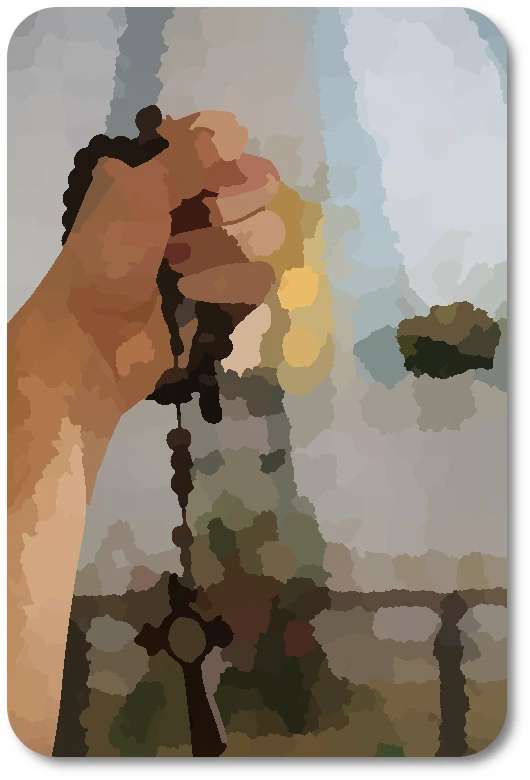- Rosary
- Joyful Mysteries
- Humility
- Practical Ways to Grow In Humility
- Rosary Meditation on Humility
Rosary Meditation on the Virtue of Humility
🌸 Rosary Meditation on the Virtue of Humility

Rosary meditation on the virtue of humility invites us into the quiet space where God speaks gently, and pride fades into prayer. In a world that rewards self-promotion and constant opinions, the Rosary slows us down.
It turns our focus inward—not in selfishness, but in surrender—where we meet Christ and learn, like Mary, to say: “Let it be done to me according to Thy word.”
Through meditating on the Rosary with humility, I’ve discovered how prayer isn’t just something we do—it’s something that changes who we are.
💠 Why the Rosary Is a Teacher of Humility

From the very first Joyful Mystery, we encounter humility. Mary doesn’t argue or question her worth. She simply trusts and accepts God’s will.
That kind of humility is not passive—it’s active trust. And when I reflect on this mystery, especially during times I feel unsure or overwhelmed, I find strength in Mary's surrender.
This echoes what I wrote in Practical Ways to Grow in Humility Through Faith: how simple, everyday acts—like caregiving or remaining unseen—shape us spiritually far more than grand gestures ever could.
📿 How I Meditate on Humility in the Rosary
Rosary meditation on the virtue of humility becomes richer when I approach it with intention.
Here’s how I usually begin:
-
Pause and Breathe
I take a few deep breaths to center myself before beginning the prayers. -
Set a Simple Intention
“Jesus, teach me humility. Mary, help me say yes to God today.” -
Visualize the Mystery
I picture the scene in my heart. What was Mary feeling at the Annunciation? What did Jesus see when He looked at the Cross? -
Let the Repetition Wash Over Me
With each Hail Mary, I’m reminded to step out of myself and into God’s presence.
🙏 A Prayer for Humility
“Humility doesn’t make you smaller—it makes room in your heart for something eternal.”
🌱 A reflection from RosarySeeds.com
🌍 Finding Stillness in a World That Shouts

Lately, I’ve found myself overwhelmed by the noise of the world—so many voices, so many opinions. News stories, online arguments, and constant reactions to every crisis. Everyone seems to have something to say. And I often wonder: Where is the truth? Who do I trust?
That’s when I come back to the Rosary.
Rosary meditation on the virtue of humility helps quiet the chaos. It reminds me that no human system or opinion can truly fix this world’s brokenness. The healing begins within—by opening the door that Jesus is knocking on in our hearts. Not by shouting louder, but by surrendering deeper.
When I sit with my beads and begin to pray, I let the noise fall away. I return to the basics: silence, trust, and love. This is where real change begins—not out there, but here.
🔍 Mysteries That Teach Humility Deeply
While all Mysteries reflect God’s humility, here are a few that speak to me most:
🌸 The Annunciation (Joyful #1)
Mary’s “yes” was quiet but life-changing. She didn’t demand understanding. She trusted.
💭 Ask yourself: Where can I respond with trust rather than control?
💔 The Scourging at the Pillar (Sorrowful #2)
Jesus bore pain silently, not because He was weak—but because He loved.
💭 Ask yourself: Can I remain gentle in moments of injustice?
🌿 The Carrying of the Cross (Sorrowful #4)
Jesus accepts help from Simon. Even our Savior allowed others to lift Him.
💭 Ask yourself: Can I ask for help when I need it, as I wrote in Practical Ways to Grow in Humility Through Faith?
👑 The Crowning with Thorns (Sorrowful #3)
Mocked and humiliated, Jesus doesn’t defend Himself. His silence is His strength.
💭 Ask yourself: Am I willing to be misunderstood for love’s sake?
🙏 Prayer to Accompany the Rosary
Jesus, meek and humble of heart,
Help me follow You in silence and surrender.
Mary, humble servant of God,
Teach me to say yes with courage and trust.
Let each Hail Mary chip away at pride,
Until only love remains. Amen.
🪷 What I’ve Learned from Humility
In writing about Humility and living it in hidden places—like when I worked as a Home Health Aide—I’ve come to see humility as a quiet strength. It doesn’t seek praise. It doesn’t need to be seen. But it is deeply powerful. It creates space for grace.
When I couldn’t rely on my own strength, when I felt invisible, when I served without recognition—that’s when I felt closest to God. That’s when I began to understand Mary.
🌾 Final Thought
Rosary meditation on the virtue of humility is more than prayer—it’s an invitation to transformation. It doesn’t happen overnight, and that’s okay. Humility is learned bead by bead, surrender by surrender.
Start simply. Sit quietly. Pray slowly. Let Mary walk with you. Let Christ speak to you through the Mysteries. He’s not asking you to do great things—just to open the door.



















